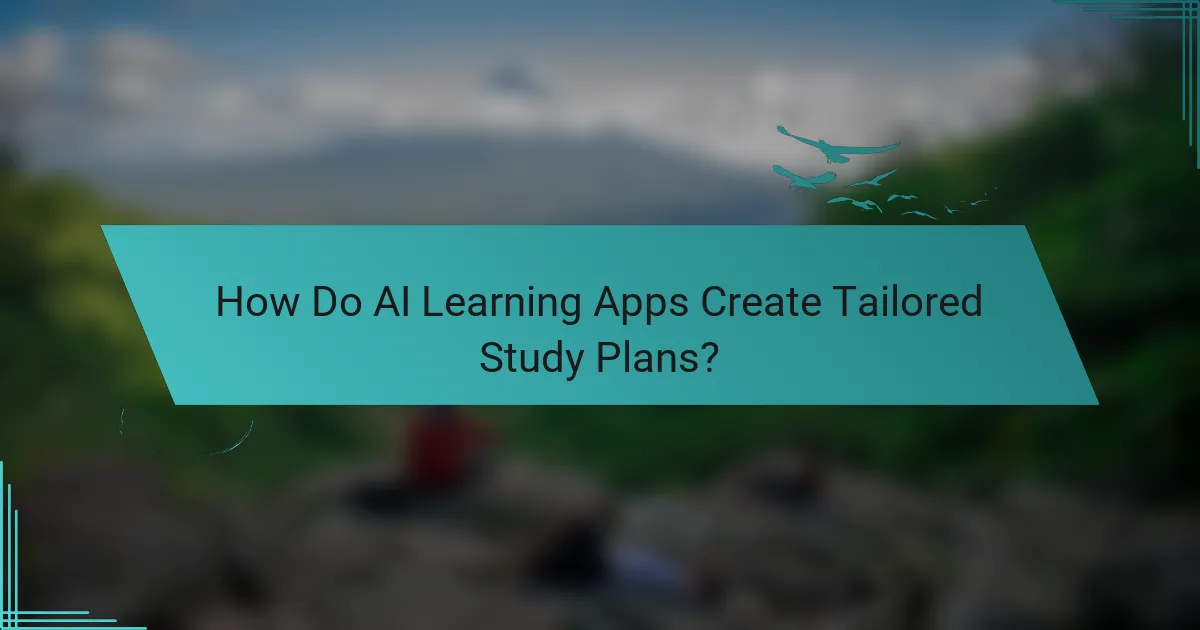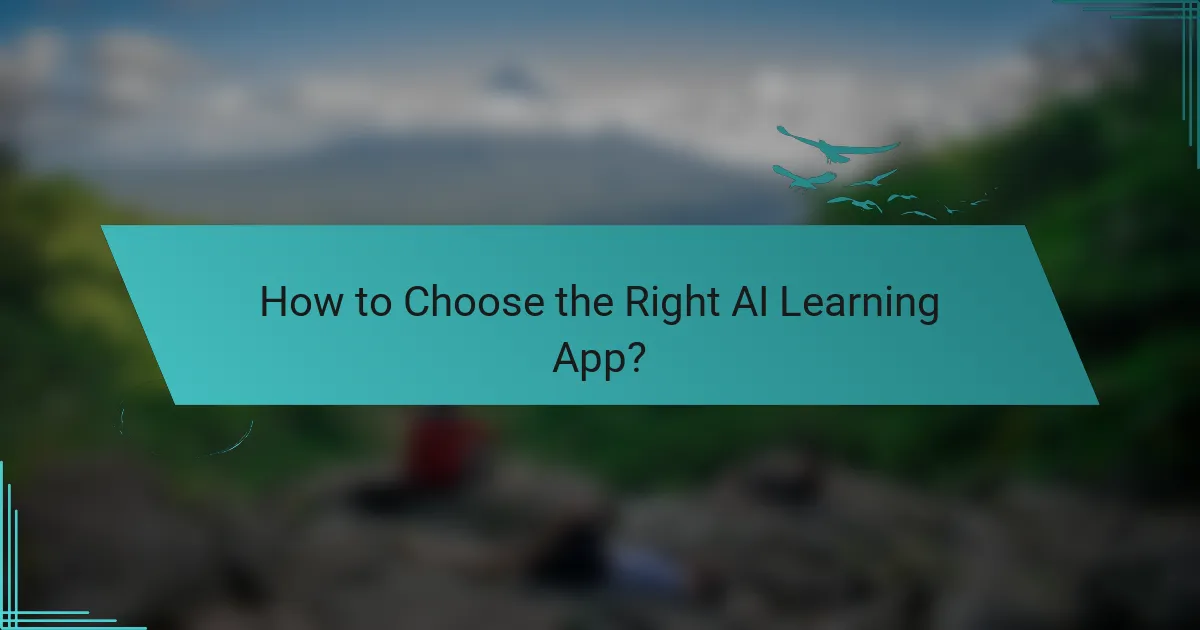AI learning apps are revolutionizing the way college students approach their studies by offering personalized study plans tailored to individual learning styles. By analyzing user data and preferences, these apps create adaptive learning experiences that enhance understanding and retention. With advanced algorithms, they track performance and adjust materials to optimize study sessions, making learning more efficient and effective.

What Are the Best AI Learning Apps for College Students?
The best AI learning apps for college students are those that provide personalized study plans and adaptive learning experiences. These tools can enhance understanding and retention, making study sessions more effective and efficient.
Quizlet
Quizlet is a versatile study tool that allows students to create and share flashcards, quizzes, and games tailored to their courses. Its AI features help generate personalized study sets based on user performance, making it easier to focus on challenging topics.
Students can track their progress over time, which aids in identifying areas that need more attention. The app is free to use, with optional premium features that enhance functionality.
Duolingo
Duolingo specializes in language learning, offering a gamified experience that adapts to the user’s skill level. Its AI-driven algorithms adjust lessons based on user responses, ensuring that learners are constantly challenged without feeling overwhelmed.
With a variety of languages available, Duolingo is ideal for students looking to fulfill language requirements or enhance their communication skills. The app is free, with a premium version that removes ads and offers additional features.
Coursera
Coursera partners with universities and organizations to provide a wide range of online courses, including many that are AI-enhanced. The platform offers personalized course recommendations based on user interests and previous learning experiences.
Students can access high-quality content from top institutions, often for free or at a low cost. Certificates can be earned for completed courses, which can be beneficial for resumes or LinkedIn profiles.
Brainscape
Brainscape uses a unique spaced repetition system to help students learn more effectively. The app allows users to create their own flashcards or choose from a library of pre-made sets, with AI algorithms optimizing the study schedule based on retention rates.
This method is particularly effective for memorizing information, making it suitable for subjects like languages, sciences, and history. The basic version is free, while a premium subscription offers advanced features.
StudyBlue
StudyBlue is a collaborative study platform that enables students to create, share, and discover study materials. Its AI features help personalize study recommendations based on user activity and performance, making it easier to find relevant resources.
The app supports various formats, including flashcards, notes, and quizzes, catering to different learning styles. While basic features are free, a subscription unlocks additional tools and resources.

How Do AI Learning Apps Create Tailored Study Plans?
AI learning apps create tailored study plans by analyzing individual user data and preferences to optimize learning experiences. These apps utilize advanced algorithms to personalize content, track performance, and adapt materials based on user progress.
Personalized Learning Algorithms
Personalized learning algorithms are at the core of AI learning apps, enabling them to customize study plans based on user behavior and preferences. These algorithms assess factors such as learning pace, strengths, and weaknesses to create a unique curriculum that aligns with each student’s needs.
For example, if a student struggles with mathematics but excels in literature, the app will allocate more time and resources to math topics while providing advanced literature materials. This approach ensures that students focus on areas requiring improvement without neglecting their strengths.
User Performance Tracking
User performance tracking is essential for refining study plans in AI learning apps. These apps continuously monitor user interactions, quiz scores, and engagement levels to gauge progress and identify areas needing attention. This data-driven approach allows for real-time adjustments to study plans.
Students can benefit from features like weekly performance reports, which highlight improvements and suggest specific topics to revisit. Regular feedback helps maintain motivation and ensures that learners stay on track toward their academic goals.
Content Adaptation
Content adaptation refers to the app’s ability to modify learning materials based on user performance and preferences. As students progress, the AI can introduce new concepts or adjust the difficulty level of existing content to match their evolving capabilities.
For instance, if a student consistently masters basic algebra, the app might introduce more complex problems or related topics like geometry. This gradual increase in difficulty helps maintain engagement and fosters a deeper understanding of the subject matter.

What Are the Benefits of Using AI Learning Apps?
AI learning apps offer personalized study plans that adapt to individual learning styles, enhancing overall academic performance. These tools leverage data analytics to create tailored experiences, making studying more efficient and effective for college students.
Improved Study Efficiency
AI learning apps streamline the study process by identifying key areas where students struggle and providing targeted resources. This focused approach allows students to spend less time on material they already understand and more time on challenging concepts.
For instance, an app might analyze a student’s quiz results and suggest specific chapters or topics to review, optimizing study sessions. This not only saves time but also helps maintain motivation by providing a clear path to improvement.
Enhanced Retention Rates
By utilizing spaced repetition and adaptive learning techniques, AI learning apps can significantly improve retention rates. These methods ensure that information is revisited at strategic intervals, reinforcing knowledge and aiding long-term memory.
Students using these apps often report better recall during exams, as the material is revisited in a way that aligns with their learning pace. This can lead to higher grades and a deeper understanding of the subject matter.
Flexible Learning Schedules
AI learning apps allow students to create flexible study schedules that fit their personal commitments. This adaptability is crucial for college students who often juggle classes, work, and extracurricular activities.
With features like reminders and progress tracking, students can study when it suits them best, whether that’s early in the morning or late at night. This flexibility helps reduce stress and encourages consistent study habits.

How to Choose the Right AI Learning App?
Choosing the right AI learning app involves understanding your specific learning needs, evaluating user feedback, and considering your budget. A well-suited app can enhance your study efficiency and academic performance.
Assess Learning Goals
Start by identifying your learning objectives. Are you looking to improve in specific subjects, prepare for exams, or develop general study skills? Clearly defined goals will help you select an app that aligns with your academic aspirations.
For instance, if your goal is to master calculus, look for apps that offer tailored practice problems and step-by-step solutions. Alternatively, if you need help with time management, seek apps that provide planning tools and study schedules.
Evaluate User Reviews
User reviews can provide valuable insights into the effectiveness and usability of an AI learning app. Check platforms like app stores or educational forums for feedback from other students.
Look for comments on features, ease of use, and customer support. Pay attention to both positive and negative reviews to get a balanced view. A high rating with numerous reviews often indicates reliability, while consistent complaints may signal potential issues.
Consider Budget Options
When choosing an AI learning app, budget is a crucial factor. Many apps offer free versions with limited features, while premium subscriptions can range from $5 to $30 per month.
Evaluate what features are essential for your learning needs and whether the investment aligns with your budget. Some apps may offer discounts for students or annual subscriptions that can save you money in the long run. Always check for free trials to test the app before committing financially.

What Are the Costs of AI Learning Apps?
The costs of AI learning apps can vary significantly based on features, access levels, and subscription types. Users can find options ranging from free basic versions to premium subscriptions that offer advanced functionalities and personalized study plans.
Free vs. Paid Versions
Free versions of AI learning apps typically provide limited features, such as basic quizzes and study materials. These can be useful for casual learners or those just starting out, but they may lack the personalized insights and advanced tools found in paid versions.
Paid versions often include tailored study plans, in-depth analytics, and access to a wider range of resources. Prices for these subscriptions can range from around $10 to $30 per month, depending on the app and its offerings.
Subscription Models
Many AI learning apps operate on subscription models, which can be monthly, quarterly, or annual. Monthly subscriptions allow for flexibility, while annual plans often provide a discount, making them more cost-effective for long-term users.
When choosing a subscription model, consider your study habits and how often you will use the app. Some platforms may offer trial periods, allowing you to test the service before committing to a payment plan. Always check for any hidden fees or cancellation policies to avoid unexpected costs.
